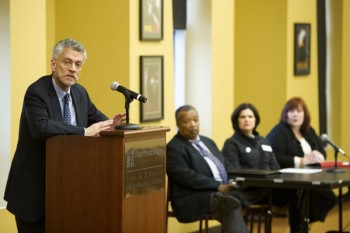At a campus forum Tuesday afternoon, members of the Northeastern community weighed in on the potential for the university to adopt a smoke-free campus policy, as speakers delivered passionate yet respectful remarks on all sides of the conversation.
In December, the university announced it had convened a committee comprised of students, faculty, and staff to explore the possibility of implementing a smoke-free policy. The committee is co-chaired by Terry Fulmer, dean of the Bouvé College of Health Sciences, and John Auerbach, director of the Institute on Urban Health Research and Distinguished Professor of Practice in Bouvé’s Department of Health Sciences.
More than 50 people—mostly students—attended the forum, which was held in the Cabral Center. After welcoming remarks from Fulmer, Auerbach noted that the forum is one of many ways the committee is gathering feedback over the next several months before delivering a set of recommendations in the spring. He indicated 200 comments have already been received through a dedicated website and via email, and that the university is also seeking feedback from the 1,100 campuses nationwide that have already implemented some form of a smoke-free policy to learn about their experiences.
Tuesday’s forum provided members of the Northeastern community with an opportunity to learn more about the topic, ask questions, and voice their comments and concerns. Also in attendance at the forum was Rosie Henson, senior policy adviser in the Office of the Assistant Secretary of Health at the U.S. Department of Health and Human Services. Henson, a 1979 Northeastern graduate, met with Bouvé officials over the course of a two-day visit to learn about Northeastern looking at a potential smoke-free policy.
Julie Roberts, a third-year law student and co-president of the Northeastern law students’ chapter of Students for Sensible Drug Policy, expressed concern about how a potential smoke-free policy would be governed, and she suggested that alternative methods to a ban be considered.
“I would encourage us to not only look at universities that have implemented bans, but also look at what universities are doing in other ways. What other public-health measures are schools taking?” said Roberts, who told the audience she quit smoking eight months ago. “We see the Red Bull car out there all the time giving out free Red Bull. How about we get out there and give away free gum or free patches?”
Later in the forum, Fulmer responded to speakers who relayed concerns about how a smoke-free policy might be handled, emphasizing that a policy would “be about adherence and support” rather than a stringent enforcement plan. This is a public-health discussion we’re having,” Fulmer said. “It all starts with each of us, and I feel very passionate about that.”

John Auerbach, the director of the Institute on Urban Health Research, speaks at Tuesday's forum.
Throughout the 90-minute forum, several students commented that a smoking ban could be stigmatizing to smokers, that a smoke-free policy would infringe on their personal rights and cultural practices, and that measures shouldn’t be taken against those with this addiction.
Avi Kurlantzick, a mechanical engineering student, agreed that addictions should be treated like a disease, and not like a crime. However, he noted that by not taking steps to reduce smoking on campus, nonsmokers are essentially being punished by having to contend with second-hand smoke. “[Those people] don’t have the choice to just not go to class, or not go into their dorm because there’s a cloud of smoke outside,” he said. “There is a flip side to the argument that we don’t want to demonize addiction or that it’s smokers’ responsibility when and where they smoke.”
Xander Miller, a first-year student majoring in biology, agreed. Miller, an avid cyclist and flute player for whom regular breathing exercises is essential, expressed frustration about having to walk through clouds of smoke outside Snell Library or his dormitory, which he said are disruptive to his health.
Other proponents of a smoke-free campus noted health studies that show the harmful health effects of smoking and second-hand smoke, as well as the environmental benefits from less smoke in the atmosphere.
Speakers on both sides applauded the forum being an important venue for constructive debate about significant issues on campus. “The important thing in this conversation today is to keep the conversation going,” one student said.
The discussion often shifted to what smoke-cessation resources are currently available to students, faculty, and staff, and the importance of educating the Northeastern community about them. Fliers outlining the resources available through the University Health and Counseling Services and through Northeastern’s student health plan were also distributed at the forum. Resources include counseling, employee assistance program, and helpful hotlines and websites.
It was also announced that a new, free program called “Ready to Quit!” will launch on Friday that is customized for students that incorporates text-messaging, initial and follow-up meetings with health staff, and free nicotine replacement products. More information will be available on northeastern.edu/uhcs.